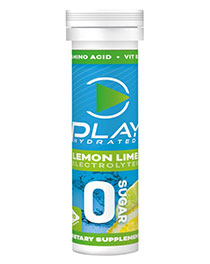
By clicking on the product links in this article, we may receive a commission fee at no cost to you, the reader. Sponsorships and affiliate commissions help support our research so we can help you find the best products. Read our full affiliate disclosure here.
It’s no surprise that sugar hides around every corner of the food industry, grocery stores, and kitchens. In the United States, we have grown accustomed to our meals being a bit larger and sweeter than in other countries. What exactly is sugar? In its most basic form, sugar is a carbohydrate broken down into glucose. Glucose is the primary energy source for cells to function in the human body. That being said, consistently eating high amounts of sugar has been linked to many chronic diseases, including cardiovascular disease, diabetes, metabolic syndrome, certain cancers, and Alzheimer’s disease, among other issues.(1)
Feel better because you’ve swapped your sugary beverages for artificially sweetened ones? Hold on because we’re here to talk about sugars and artificial sweeteners and how they can affect your health. We will also answer the big question, is sugar bad for you?
Which Sugars Are Good For You & Which Should You Avoid (Natural vs. Added Sugar)
We commonly ingest three types of sweeteners: natural sugar, processed sugar, and artificial sweeteners.
Natural Sugar
Natural sugar, as it sounds, comes from nature in whole food form and is untouched by humans. Natural sugar sources include fruits, starchy vegetables such as sweet potatoes, corn, and whole grains. Sugar from these sources is considered healthy due to the presence of additional nutrients like fiber, vitamins, and minerals.
Despite this form of sugar being healthy, those needing to monitor their blood glucose still need to limit their consumption.
Processed Sugar
Processed sugar is any sugar that provides calories in the diet and has been stripped of all beneficial ingredients like fiber. Because there’s no fiber present, processed sugar is absorbed more quickly, thus spiking blood sugar levels.(2) Processed sugar is found in almost all packaged foods.
Look out for some of these terms in the ingredient list:
- Cane sugar
- Cane syrup
- Evaporated cane juice
- Corn syrup
- High fructose corn syrup
- Brown sugar
- Rice syrup
- Molasses
Energy and sports drinks can have a high amount of added sugars or artificial sweeteners. For a NO sugar alternative, try Play Hydrated electrolyte drink tablets. Available in lemon-lime, orange, strawberry, and fruit punch flavors. Use code ACTIVE20 for 20% Off your purchase.
Artificial Sweeteners
Artificial sweeteners are commonly called nonnutritive sweeteners and are a large part of our culture. They are often lab created or extracted from natural sources and then processed into an easy-to-consume form.
Some common artificial sweeteners are:
- Aspartame
- Saccharine
- Sucralose
- Neotame
- Acesulfame-K
How Much Sugar is Too Much?
An average American takes in an estimated 66 pounds of added sugar yearly, which equals about 19.5 teaspoons daily. Let’s compare this to the American Heart Association’s recommendation that adult women eat less than six teaspoons (25 grams) daily and adult men eat less than nine teaspoons (38 grams) of added sugar daily.(1)
You can determine how much sugar is in purchased food and drink items by looking at the nutrition facts label and finding “sugar.” It’s written in grams.
Let’s look at the amount of sugar in everyday food items.
- One 20-ounce sports drink = 9 teaspoons of sugar
- One 12-ounce can of soda = nearly 10 teaspoons of sugar
- One serving of fruity cereal = 3 teaspoons of sugar
- One serving of granola = 4 teaspoons of sugar
- One cup of flavored low-fat yogurt = 11 teaspoons of sugar
As you can see, sugar lurks in high amounts around every corner. By avoiding sugar, sweetened beverages, and highly processed foods, you’re more likely to reduce your overall sugar intake.
Symptoms of Too Much Sugar
Consuming too much sugar has been linked to obesity, cardiovascular diseases, type 2 diabetes, and metabolic syndrome. Overeating sugar causes increased inflammation, which can potentially worsen other chronic conditions, such as multiple sclerosis, psoriasis, rheumatoid arthritis, and inflammatory bowel disease.(3)
High sugar intake can also increase the risk of getting a chronic disease. Along with obesity, cardiovascular disease, and diabetes, current research shows that overeating added sugar can cause non-alcoholic fatty liver disease, cancer, and dementia.(4,5,6)
In the short term, too much sugar may experience weight gain, high cholesterol, high blood pressure, and skin abnormalities.(7,8)
What About Artificial Sweeteners?
Artificial sweeteners have grown in popularity due to claims that they help promote weight loss. However, emerging research is pointing out that some of these claims are not true, not to mention there may be potential side effects. (9)
Studies have shown that eating foods or drinks with artificial sweeteners may cause sugar cravings, increased appetite, increased food intake, and weight gain.(10) Artificial sweeteners have also been linked to type 2 diabetes.(11) One study revealed that women consuming more than two sugar-sweetened beverages per day had an increased risk of stroke and coronary heart disease.(10)
More research needs to be done to verify these results. At this time, the FDA states that the artificial sweeteners mentioned above are still generally recognized as safe for consumption.
Use code ACTIVE20 for 20% off your purchase of Play Hydrated.
Effects of Sugar on the Body
What does sugar do to the body? In the case of healthy individuals, when foods containing sugar are consumed, the body recognizes glucose and releases insulin from the pancreas. Insulin acts as a key to open the door, allowing glucose inside. Once inside, glucose gets to work and is either converted into ATP for energy or glycogen, the stored version of glucose kept in the liver. This can then be converted to fat or used for energy later.(1)
When our bodies aren’t functioning correctly, insulin may not be released, and glucose will stay outside of the cells, causing the complications often seen in people with diabetes, like nerve pain, non-healing wounds, and blindness.(12,13)
Foods that Contain the Most Sugar
When determining which foods contain the most sugar, think about the amount of sugar in a food relating to the nutritional value of the food—are there beneficial nutrients in the food?—and the serving size. The World Health Organization recommends eating no more than 5 to 10% of your total daily calories from sugar. As mentioned earlier, the American Heart Association also recommends a daily sugar limitation.
Foods that have the most sugar will likely taste sweet. Think candy, juice, and sodas. However, some high-sugar foods won’t necessarily taste sweet but will be overly refined in carbohydrates, like white bread, white rice, and white pasta.
Let’s take a look at some examples of foods and drinks that have the most sugar:
- Sports drinks
- Sodas
- Juice
- Energy drinks
- Flavored coffees
- Candy
- Cakes, pies, cobblers, cookies
- Sugary, cereal, and granola bars
- Cereal bars
- Canned fruit in syrup
You might notice that a surprisingly high percentage of this list is made up of beverages. Sugar-sweetened drinks are the largest source of added sugar in our diet.(14) For those regularly consuming drinks with added sugar, by simply choosing drinks that aren’t sweetened, you’ll likely lose weight and reduce the risk of chronic disease that comes with excessive sugar intake.
For an excellent alternative to sugar-heavy energy and sports drinks, Play Hydrated is an electrolyte-packed drink tablet with NO sugar added. Use code ACTIVE20 for 20% off your purchase.
FAQs
What is Added Sugar?
Added sugars are not naturally found in foods but are added to food products to sweeten them before consumption.
What Type of Sugar is Best for Your Body?
The best type of sugar for your body comes from the natural sugar from whole foods. Examples include fruits, whole grains, and starchy vegetables like sweet potatoes, white potatoes, winter squash, and peas.
Can You Flush Out Sugar by Drinking Water?
Unfortunately, you cannot flush out sugar by drinking more water. You may lower your blood sugar somewhat because excess water will dilute it, but drinking too much water also comes with health risks. The best way to help reduce the amount of sugar in your body can be accomplished by reducing your overall consumption.
Why Trust Us?
The health and safety of ACTIVE’s readers is of the utmost importance to us. To ensure your well-being when consuming food products, the ACTIVE.com editorial team prioritizes products that rank high in nutritional value. We’ve consulted with a team of nutritionists and dieticians to ensure the products we feature are of the highest standard. This helps us create the most accurate, authentic review content for our readers.
References
- White JR Jr. Sugar. Clin Diabetes. 2018 Jan;36(1):74-76. doi: 10.2337/cd17-0084. PMID: 29382983; PMCID: PMC5775006.
- Jenkins DJ, Jenkins AL. Dietary fiber and the glycemic response. Proc Soc Exp Biol Med. 1985 Dec;180(3):422-31. doi: 10.3181/00379727-180-42199. PMID: 3001740.
- Ma X, Nan F, Liang H, Shu P, Fan X, Song X, Hou Y, Zhang D. Excessive intake of sugar: An accomplice of inflammation. Front Immunol. 2022 Aug 31;13:988481. doi: 10.3389/fimmu.2022.988481. PMID: 36119103; PMCID: PMC9471313.
- Lustig RH. Fructose: metabolic, hedonic, and societal parallels with ethanol. J Am Diet Assoc. 2010 Sep;110(9):1307-21. doi: 10.1016/j.jada.2010.06.008. PMID: 20800122.
- Aranceta Bartrina J, Pérez Rodrigo C. Relación entre el consumo de sacarosa y cáncer: una revisión de la evidencia [Association between sucrose intake and cancer: a review of the evidence]. Nutr Hosp. 2013 Jul;28 Suppl 4:95-105. Spanish. doi: 10.3305/nh.2013.28.sup4.6802. PMID: 23834098.
- Stephan BC, Wells JC, Brayne C, Albanese E, Siervo M. Increased fructose intake as a risk factor for dementia. J Gerontol A Biol Sci Med Sci. 2010 Aug;65(8):809-14. doi: 10.1093/gerona/glq079. Epub 2010 May 26. PMID: 20504892.
- Witek K, Wydra K, Filip M. A High-Sugar Diet Consumption, Metabolism and Health Impacts with a Focus on the Development of Substance Use Disorder: A Narrative Review. Nutrients. 2022 Jul 18;14(14):2940. doi: 10.3390/nu14142940. PMID: 35889898; PMCID: PMC9323357.
- Katta R, Desai SP. Diet and dermatology: the role of dietary intervention in skin disease. J Clin Aesthet Dermatol. 2014 Jul;7(7):46-51. PMID: 25053983; PMCID: PMC4106357.
- Sharma A, Amarnath S, Thulasimani M, Ramaswamy S. Artificial sweeteners as a sugar substitute: Are they really safe? Indian J Pharmacol. 2016 May-Jun;48(3):237-40. doi: 10.4103/0253-7613.182888. PMID: 27298490; PMCID: PMC4899993.
- Gardener H, Elkind MSV. Artificial Sweeteners, Real Risks. Stroke. 2019 Mar;50(3):549-551. doi: 10.1161/STROKEAHA.119.024456. PMID: 30760171; PMCID: PMC6389377.
- Purohit V, Mishra S. The truth about artificial sweeteners - Are they good for diabetics? Indian Heart J. 2018 Jan-Feb;70(1):197-199. doi: 10.1016/j.ihj.2018.01.020. PMID: 29455781; PMCID: PMC5903011.
- Nakrani MN, Wineland RH, Anjum F. Physiology, Glucose Metabolism. [Updated 2022 Jul 25]. In: StatPearls [Internet]. Treasure Island (FL): StatPearls Publishing; 2023 Jan-. Available from: https://www.ncbi.nlm.nih.gov/books/NBK560599/?report=classic
- Deshpande AD, Harris-Hayes M, Schootman M. Epidemiology of diabetes and diabetes-related complications. Phys Ther. 2008 Nov;88(11):1254-64. doi: 10.2522/ptj.20080020. Epub 2008 Sep 18. PMID: 18801858; PMCID: PMC3870323.
- Malik VS, Hu FB. Sugar-Sweetened Beverages and Cardiometabolic Health: An Update of the Evidence. Nutrients. 2019 Aug 8;11(8):1840. doi: 10.3390/nu11081840. PMID: 31398911; PMCID: PMC6723421.




